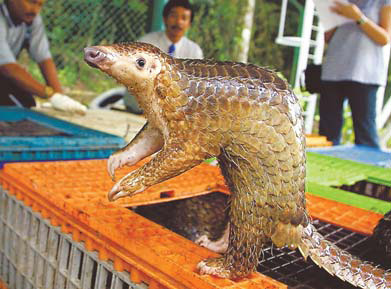Fears grow for Asia's endangered anteaters
|
A Malayan pangolin is seen out of its cage after being confiscated by the Department of Wildlife and Natural Parks in Kuala Lumpur. Jimin Lai / Agence France-Presse |
BANGKOK - Tiger poaching gets the press but wildlife groups in Asia are increasingly fearful for the future of a smaller, scalier and "less sexy" creature: the pangolin.
The meat and supposed medicinal properties of this reclusive anteater are so prized that it is now thought to be the most heavily trafficked mammal in the region, rapidly being driven toward extinction.
"The volumes we are seeing in seizures are mind-boggling. No species can survive this level of extraction for long," said Kanitha Krishnasamy from the wildlife trade watchdog Traffic.
"Unfortunately, this scaly animal does not invoke as much attention from the public and, by extension, the authorities, as pangolins are considered to be less sexy than their larger mammalian counterparts," she added.
Tigers are also killed for their body parts, mostly for use in traditional Asian medicines, and major international campaigns have been launched to save them from extinction.
Trading in pangolins is banned under international law, yet Traffic's Asian surveys show they are frequently poached from the wild, mainly in Indonesia and Malaysia, exacerbating the threat from rapid deforestation.
They are transported through Southeast Asia, mostly ending up in China and Vietnam, where pangolin flesh is a delicacy and its scales - it is the only mammal known to have them - are ground into a powder for medicinal purposes.
Historically, this ingredient was used in Chinese medicine to try to cure a range of ills, from children's hysterical crying to eyelashes curling inwards, according to researcher and pangolin expert Dan Challender.
Today, reports suggest the scales are used in an attempt to reduce swellings, cure asthma and, even in some cases, cancer, but a lack of solid analysis means "all uses seem unfounded to date", he said.
Challender, at Britain's University of Kent, added that the supposed health benefits of eating the meat include nourishing the kidneys.
"Unless efforts are taken to address both the demand for, and supply of pangolins, they will go extinct in Asia in the short-term future," he said.
Of four species found in Asia, two are "endangered" and two "near threatened", according to the International Union for Conservation of Nature, which says it is unknown how many of the secretive, nocturnal animals are left.
Two of four species found in Africa are also "near threatened", and all have decreasing populations, while Challender said seizures of scales bound for Asia from Africa suggested a developing trade.
Likened in appearance to a globe artichoke, the pangolin curls up into a ball when under threat, making them easy for humans to catch.
Steve Galster, director of the anti-trafficking Freeland foundation, said the shy creatures were the "unknown problem" of Asia's illegal wildlife trade, sometimes fetching more than $1,000 each on the black market.
"The price of pangolins is just going through the roof," he said. "We're surprised there are any left."
Already this year, seizures have been reported along trading routes in Thailand, Cambodia, India, Malaysia, Nepal, Myanmar, Vietnam and Indonesia - but these are probably just the tip of the iceberg, according to Traffic.
In one of the biggest hauls, the group said customs officials at a Jakarta port found 7.5 tons of pangolin meat in May, stashed in crates and covered up with frozen fish, bound for Vietnam.
"The most outrageous thing here is they even exterminate the young pangolins, the ones that when curled up are about 20 centimeters long," port customs Chief Rahmat Subagio was quoted as saying after the find.
Late last year, seized logbooks showed one trafficking gang alone had killed and traded 22,200 pangolins over 14 months in the eastern Malaysian state of Sabah on Borneo, Traffic said.
Often, however, pangolins are transported alive to maintain freshness and smugglers are known to inject them with water to increase their weight - although many die along the way without food or drinking water, activists say.
Bundled into tightly-bound sacks, the poor-sighted pangolin finds its long sharp claws - normally used to dig at anthills - can become a danger: It is common for them to blind each other as they try to escape.
Experts warn their removal from the wild also threatens to destabilize the ecosystem of tropical forests, where the pangolin's diet of ants and termites is a key form of pest control.
Asian authorities are often unwilling to go after people of influence: "the big mafias, the big well-connected traffickers", said Galster.
He said laws against wildlife crime are weakened by loopholes and judges who don't take the issue seriously, despite the perpetrators often making millions of dollars by exploiting endangered species.
"We've seen too many traffickers get a slap on the wrist, if anything," he said.
Agence France-Presse



















